Business Law Assignment: Director's Duties and Corporate Veil
VerifiedAdded on 2020/04/07
|7
|1761
|222
Essay
AI Summary
This business law assignment delves into the intricacies of corporate governance within the Australian Commonwealth, primarily focusing on the Corporations Act 2001. The essay examines the legal obligations of company directors, encompassing both common law fiduciary duties and statutory responsibilities outlined in the Act. It explores potential liabilities, including civil and criminal penalties, arising from breaches of these duties. A significant portion of the assignment is dedicated to the concept of the corporate veil, its implications for shareholder protection, and the circumstances under which courts may lift the veil to attribute liability to individuals. The assignment also addresses the business judgment rule as a defense for directors and provides a comprehensive overview of the legal framework governing corporate responsibility in Australia, emphasizing the protection of corporate interests and stakeholder rights. The assignment uses case laws and academic articles to support arguments.
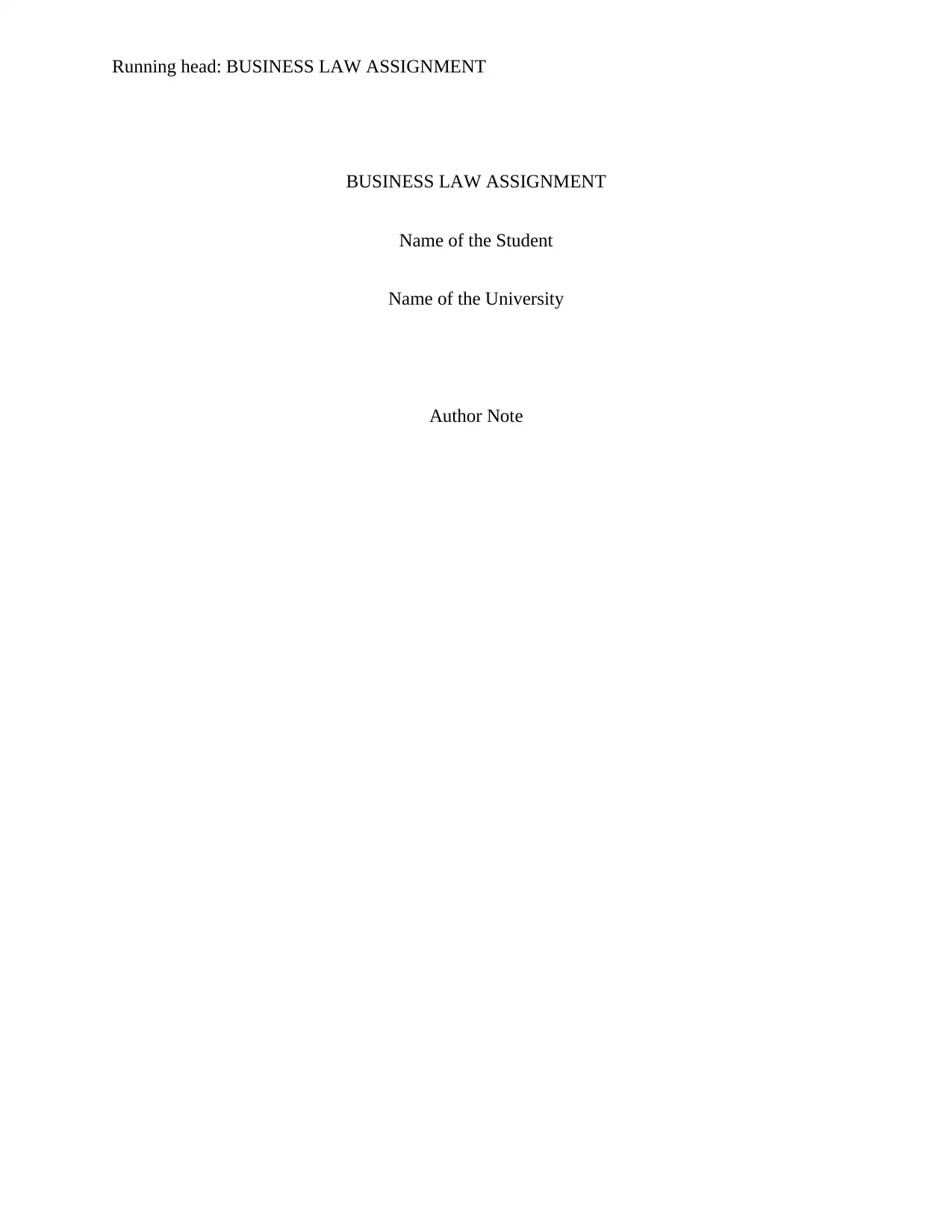
Running head: BUSINESS LAW ASSIGNMENT
BUSINESS LAW ASSIGNMENT
Name of the Student
Name of the University
Author Note
BUSINESS LAW ASSIGNMENT
Name of the Student
Name of the University
Author Note
Paraphrase This Document
Need a fresh take? Get an instant paraphrase of this document with our AI Paraphraser
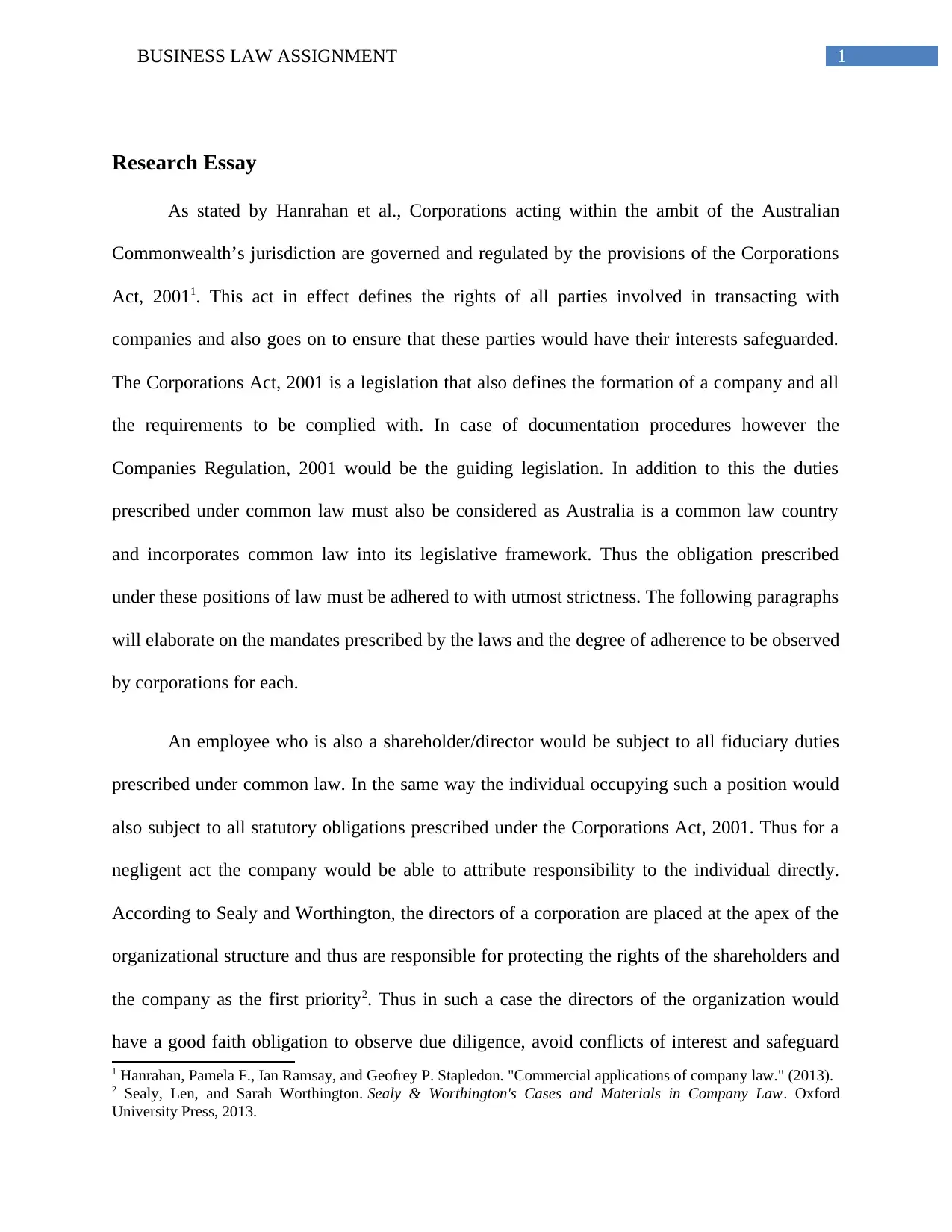
1BUSINESS LAW ASSIGNMENT
Research Essay
As stated by Hanrahan et al., Corporations acting within the ambit of the Australian
Commonwealth’s jurisdiction are governed and regulated by the provisions of the Corporations
Act, 20011. This act in effect defines the rights of all parties involved in transacting with
companies and also goes on to ensure that these parties would have their interests safeguarded.
The Corporations Act, 2001 is a legislation that also defines the formation of a company and all
the requirements to be complied with. In case of documentation procedures however the
Companies Regulation, 2001 would be the guiding legislation. In addition to this the duties
prescribed under common law must also be considered as Australia is a common law country
and incorporates common law into its legislative framework. Thus the obligation prescribed
under these positions of law must be adhered to with utmost strictness. The following paragraphs
will elaborate on the mandates prescribed by the laws and the degree of adherence to be observed
by corporations for each.
An employee who is also a shareholder/director would be subject to all fiduciary duties
prescribed under common law. In the same way the individual occupying such a position would
also subject to all statutory obligations prescribed under the Corporations Act, 2001. Thus for a
negligent act the company would be able to attribute responsibility to the individual directly.
According to Sealy and Worthington, the directors of a corporation are placed at the apex of the
organizational structure and thus are responsible for protecting the rights of the shareholders and
the company as the first priority2. Thus in such a case the directors of the organization would
have a good faith obligation to observe due diligence, avoid conflicts of interest and safeguard
1 Hanrahan, Pamela F., Ian Ramsay, and Geofrey P. Stapledon. "Commercial applications of company law." (2013).
2 Sealy, Len, and Sarah Worthington. Sealy & Worthington's Cases and Materials in Company Law. Oxford
University Press, 2013.
Research Essay
As stated by Hanrahan et al., Corporations acting within the ambit of the Australian
Commonwealth’s jurisdiction are governed and regulated by the provisions of the Corporations
Act, 20011. This act in effect defines the rights of all parties involved in transacting with
companies and also goes on to ensure that these parties would have their interests safeguarded.
The Corporations Act, 2001 is a legislation that also defines the formation of a company and all
the requirements to be complied with. In case of documentation procedures however the
Companies Regulation, 2001 would be the guiding legislation. In addition to this the duties
prescribed under common law must also be considered as Australia is a common law country
and incorporates common law into its legislative framework. Thus the obligation prescribed
under these positions of law must be adhered to with utmost strictness. The following paragraphs
will elaborate on the mandates prescribed by the laws and the degree of adherence to be observed
by corporations for each.
An employee who is also a shareholder/director would be subject to all fiduciary duties
prescribed under common law. In the same way the individual occupying such a position would
also subject to all statutory obligations prescribed under the Corporations Act, 2001. Thus for a
negligent act the company would be able to attribute responsibility to the individual directly.
According to Sealy and Worthington, the directors of a corporation are placed at the apex of the
organizational structure and thus are responsible for protecting the rights of the shareholders and
the company as the first priority2. Thus in such a case the directors of the organization would
have a good faith obligation to observe due diligence, avoid conflicts of interest and safeguard
1 Hanrahan, Pamela F., Ian Ramsay, and Geofrey P. Stapledon. "Commercial applications of company law." (2013).
2 Sealy, Len, and Sarah Worthington. Sealy & Worthington's Cases and Materials in Company Law. Oxford
University Press, 2013.
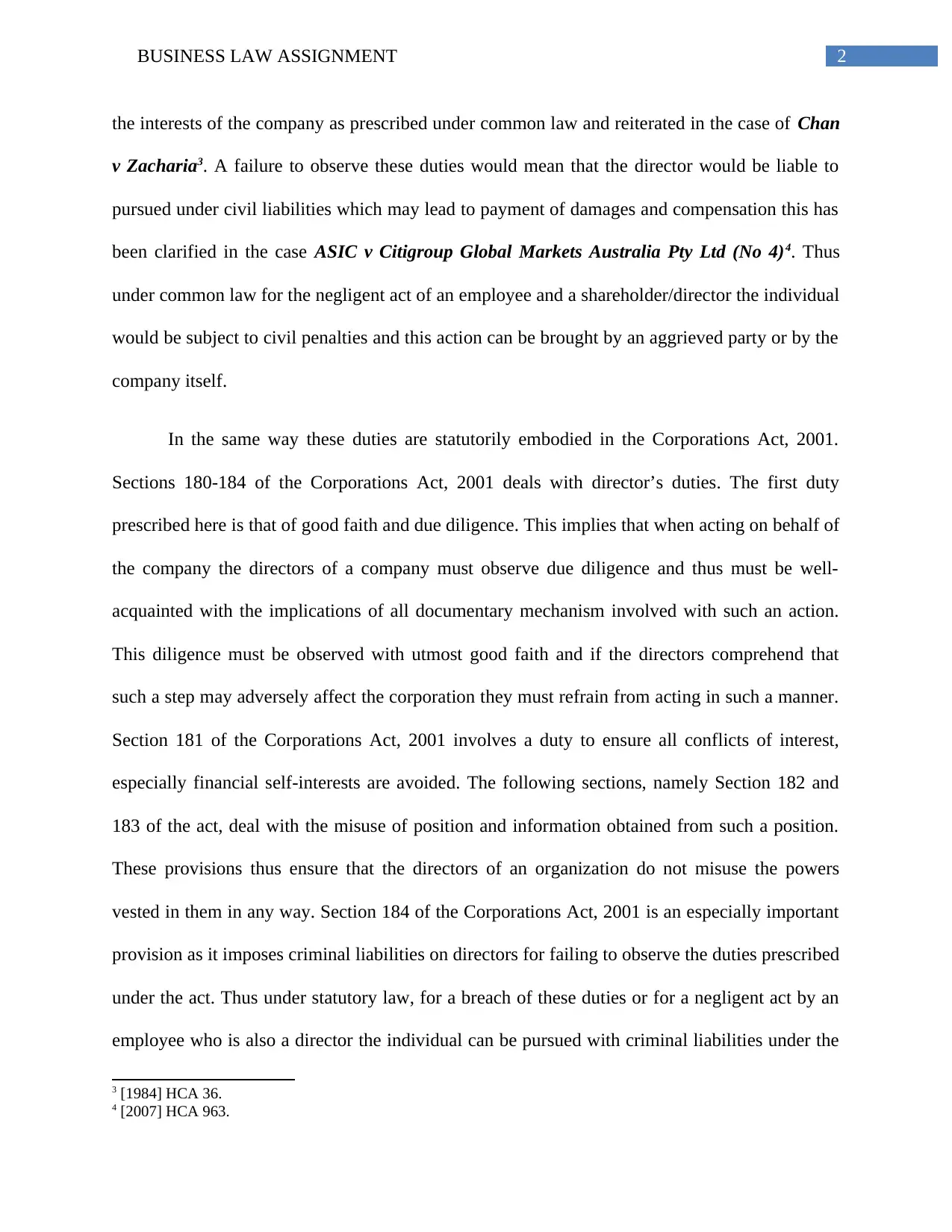
2BUSINESS LAW ASSIGNMENT
the interests of the company as prescribed under common law and reiterated in the case of Chan
v Zacharia3. A failure to observe these duties would mean that the director would be liable to
pursued under civil liabilities which may lead to payment of damages and compensation this has
been clarified in the case ASIC v Citigroup Global Markets Australia Pty Ltd (No 4)4. Thus
under common law for the negligent act of an employee and a shareholder/director the individual
would be subject to civil penalties and this action can be brought by an aggrieved party or by the
company itself.
In the same way these duties are statutorily embodied in the Corporations Act, 2001.
Sections 180-184 of the Corporations Act, 2001 deals with director’s duties. The first duty
prescribed here is that of good faith and due diligence. This implies that when acting on behalf of
the company the directors of a company must observe due diligence and thus must be well-
acquainted with the implications of all documentary mechanism involved with such an action.
This diligence must be observed with utmost good faith and if the directors comprehend that
such a step may adversely affect the corporation they must refrain from acting in such a manner.
Section 181 of the Corporations Act, 2001 involves a duty to ensure all conflicts of interest,
especially financial self-interests are avoided. The following sections, namely Section 182 and
183 of the act, deal with the misuse of position and information obtained from such a position.
These provisions thus ensure that the directors of an organization do not misuse the powers
vested in them in any way. Section 184 of the Corporations Act, 2001 is an especially important
provision as it imposes criminal liabilities on directors for failing to observe the duties prescribed
under the act. Thus under statutory law, for a breach of these duties or for a negligent act by an
employee who is also a director the individual can be pursued with criminal liabilities under the
3 [1984] HCA 36.
4 [2007] HCA 963.
the interests of the company as prescribed under common law and reiterated in the case of Chan
v Zacharia3. A failure to observe these duties would mean that the director would be liable to
pursued under civil liabilities which may lead to payment of damages and compensation this has
been clarified in the case ASIC v Citigroup Global Markets Australia Pty Ltd (No 4)4. Thus
under common law for the negligent act of an employee and a shareholder/director the individual
would be subject to civil penalties and this action can be brought by an aggrieved party or by the
company itself.
In the same way these duties are statutorily embodied in the Corporations Act, 2001.
Sections 180-184 of the Corporations Act, 2001 deals with director’s duties. The first duty
prescribed here is that of good faith and due diligence. This implies that when acting on behalf of
the company the directors of a company must observe due diligence and thus must be well-
acquainted with the implications of all documentary mechanism involved with such an action.
This diligence must be observed with utmost good faith and if the directors comprehend that
such a step may adversely affect the corporation they must refrain from acting in such a manner.
Section 181 of the Corporations Act, 2001 involves a duty to ensure all conflicts of interest,
especially financial self-interests are avoided. The following sections, namely Section 182 and
183 of the act, deal with the misuse of position and information obtained from such a position.
These provisions thus ensure that the directors of an organization do not misuse the powers
vested in them in any way. Section 184 of the Corporations Act, 2001 is an especially important
provision as it imposes criminal liabilities on directors for failing to observe the duties prescribed
under the act. Thus under statutory law, for a breach of these duties or for a negligent act by an
employee who is also a director the individual can be pursued with criminal liabilities under the
3 [1984] HCA 36.
4 [2007] HCA 963.
⊘ This is a preview!⊘
Do you want full access?
Subscribe today to unlock all pages.

Trusted by 1+ million students worldwide
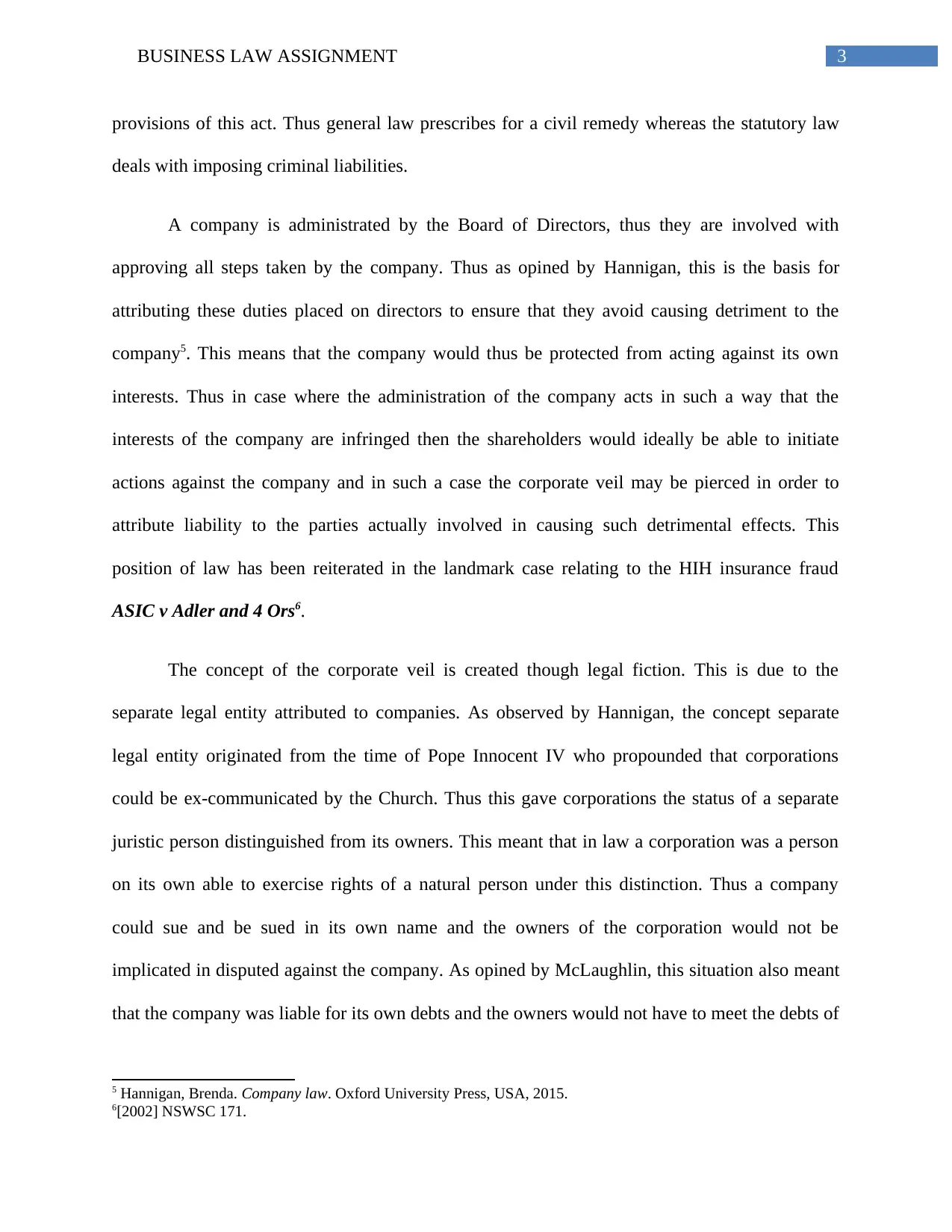
3BUSINESS LAW ASSIGNMENT
provisions of this act. Thus general law prescribes for a civil remedy whereas the statutory law
deals with imposing criminal liabilities.
A company is administrated by the Board of Directors, thus they are involved with
approving all steps taken by the company. Thus as opined by Hannigan, this is the basis for
attributing these duties placed on directors to ensure that they avoid causing detriment to the
company5. This means that the company would thus be protected from acting against its own
interests. Thus in case where the administration of the company acts in such a way that the
interests of the company are infringed then the shareholders would ideally be able to initiate
actions against the company and in such a case the corporate veil may be pierced in order to
attribute liability to the parties actually involved in causing such detrimental effects. This
position of law has been reiterated in the landmark case relating to the HIH insurance fraud
ASIC v Adler and 4 Ors6.
The concept of the corporate veil is created though legal fiction. This is due to the
separate legal entity attributed to companies. As observed by Hannigan, the concept separate
legal entity originated from the time of Pope Innocent IV who propounded that corporations
could be ex-communicated by the Church. Thus this gave corporations the status of a separate
juristic person distinguished from its owners. This meant that in law a corporation was a person
on its own able to exercise rights of a natural person under this distinction. Thus a company
could sue and be sued in its own name and the owners of the corporation would not be
implicated in disputed against the company. As opined by McLaughlin, this situation also meant
that the company was liable for its own debts and the owners would not have to meet the debts of
5 Hannigan, Brenda. Company law. Oxford University Press, USA, 2015.
6[2002] NSWSC 171.
provisions of this act. Thus general law prescribes for a civil remedy whereas the statutory law
deals with imposing criminal liabilities.
A company is administrated by the Board of Directors, thus they are involved with
approving all steps taken by the company. Thus as opined by Hannigan, this is the basis for
attributing these duties placed on directors to ensure that they avoid causing detriment to the
company5. This means that the company would thus be protected from acting against its own
interests. Thus in case where the administration of the company acts in such a way that the
interests of the company are infringed then the shareholders would ideally be able to initiate
actions against the company and in such a case the corporate veil may be pierced in order to
attribute liability to the parties actually involved in causing such detrimental effects. This
position of law has been reiterated in the landmark case relating to the HIH insurance fraud
ASIC v Adler and 4 Ors6.
The concept of the corporate veil is created though legal fiction. This is due to the
separate legal entity attributed to companies. As observed by Hannigan, the concept separate
legal entity originated from the time of Pope Innocent IV who propounded that corporations
could be ex-communicated by the Church. Thus this gave corporations the status of a separate
juristic person distinguished from its owners. This meant that in law a corporation was a person
on its own able to exercise rights of a natural person under this distinction. Thus a company
could sue and be sued in its own name and the owners of the corporation would not be
implicated in disputed against the company. As opined by McLaughlin, this situation also meant
that the company was liable for its own debts and the owners would not have to meet the debts of
5 Hannigan, Brenda. Company law. Oxford University Press, USA, 2015.
6[2002] NSWSC 171.
Paraphrase This Document
Need a fresh take? Get an instant paraphrase of this document with our AI Paraphraser
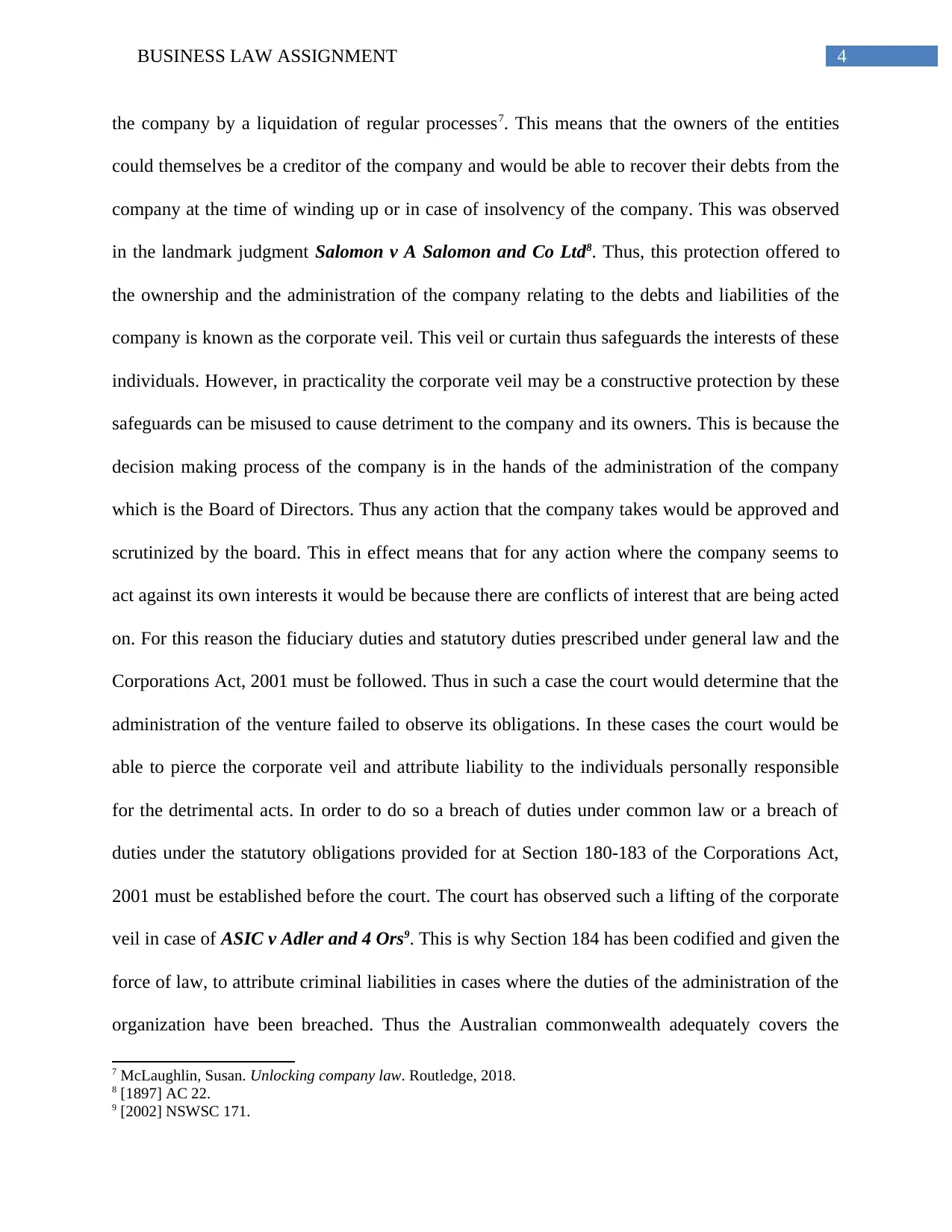
4BUSINESS LAW ASSIGNMENT
the company by a liquidation of regular processes7. This means that the owners of the entities
could themselves be a creditor of the company and would be able to recover their debts from the
company at the time of winding up or in case of insolvency of the company. This was observed
in the landmark judgment Salomon v A Salomon and Co Ltd8. Thus, this protection offered to
the ownership and the administration of the company relating to the debts and liabilities of the
company is known as the corporate veil. This veil or curtain thus safeguards the interests of these
individuals. However, in practicality the corporate veil may be a constructive protection by these
safeguards can be misused to cause detriment to the company and its owners. This is because the
decision making process of the company is in the hands of the administration of the company
which is the Board of Directors. Thus any action that the company takes would be approved and
scrutinized by the board. This in effect means that for any action where the company seems to
act against its own interests it would be because there are conflicts of interest that are being acted
on. For this reason the fiduciary duties and statutory duties prescribed under general law and the
Corporations Act, 2001 must be followed. Thus in such a case the court would determine that the
administration of the venture failed to observe its obligations. In these cases the court would be
able to pierce the corporate veil and attribute liability to the individuals personally responsible
for the detrimental acts. In order to do so a breach of duties under common law or a breach of
duties under the statutory obligations provided for at Section 180-183 of the Corporations Act,
2001 must be established before the court. The court has observed such a lifting of the corporate
veil in case of ASIC v Adler and 4 Ors9. This is why Section 184 has been codified and given the
force of law, to attribute criminal liabilities in cases where the duties of the administration of the
organization have been breached. Thus the Australian commonwealth adequately covers the
7 McLaughlin, Susan. Unlocking company law. Routledge, 2018.
8 [1897] AC 22.
9 [2002] NSWSC 171.
the company by a liquidation of regular processes7. This means that the owners of the entities
could themselves be a creditor of the company and would be able to recover their debts from the
company at the time of winding up or in case of insolvency of the company. This was observed
in the landmark judgment Salomon v A Salomon and Co Ltd8. Thus, this protection offered to
the ownership and the administration of the company relating to the debts and liabilities of the
company is known as the corporate veil. This veil or curtain thus safeguards the interests of these
individuals. However, in practicality the corporate veil may be a constructive protection by these
safeguards can be misused to cause detriment to the company and its owners. This is because the
decision making process of the company is in the hands of the administration of the company
which is the Board of Directors. Thus any action that the company takes would be approved and
scrutinized by the board. This in effect means that for any action where the company seems to
act against its own interests it would be because there are conflicts of interest that are being acted
on. For this reason the fiduciary duties and statutory duties prescribed under general law and the
Corporations Act, 2001 must be followed. Thus in such a case the court would determine that the
administration of the venture failed to observe its obligations. In these cases the court would be
able to pierce the corporate veil and attribute liability to the individuals personally responsible
for the detrimental acts. In order to do so a breach of duties under common law or a breach of
duties under the statutory obligations provided for at Section 180-183 of the Corporations Act,
2001 must be established before the court. The court has observed such a lifting of the corporate
veil in case of ASIC v Adler and 4 Ors9. This is why Section 184 has been codified and given the
force of law, to attribute criminal liabilities in cases where the duties of the administration of the
organization have been breached. Thus the Australian commonwealth adequately covers the
7 McLaughlin, Susan. Unlocking company law. Routledge, 2018.
8 [1897] AC 22.
9 [2002] NSWSC 171.
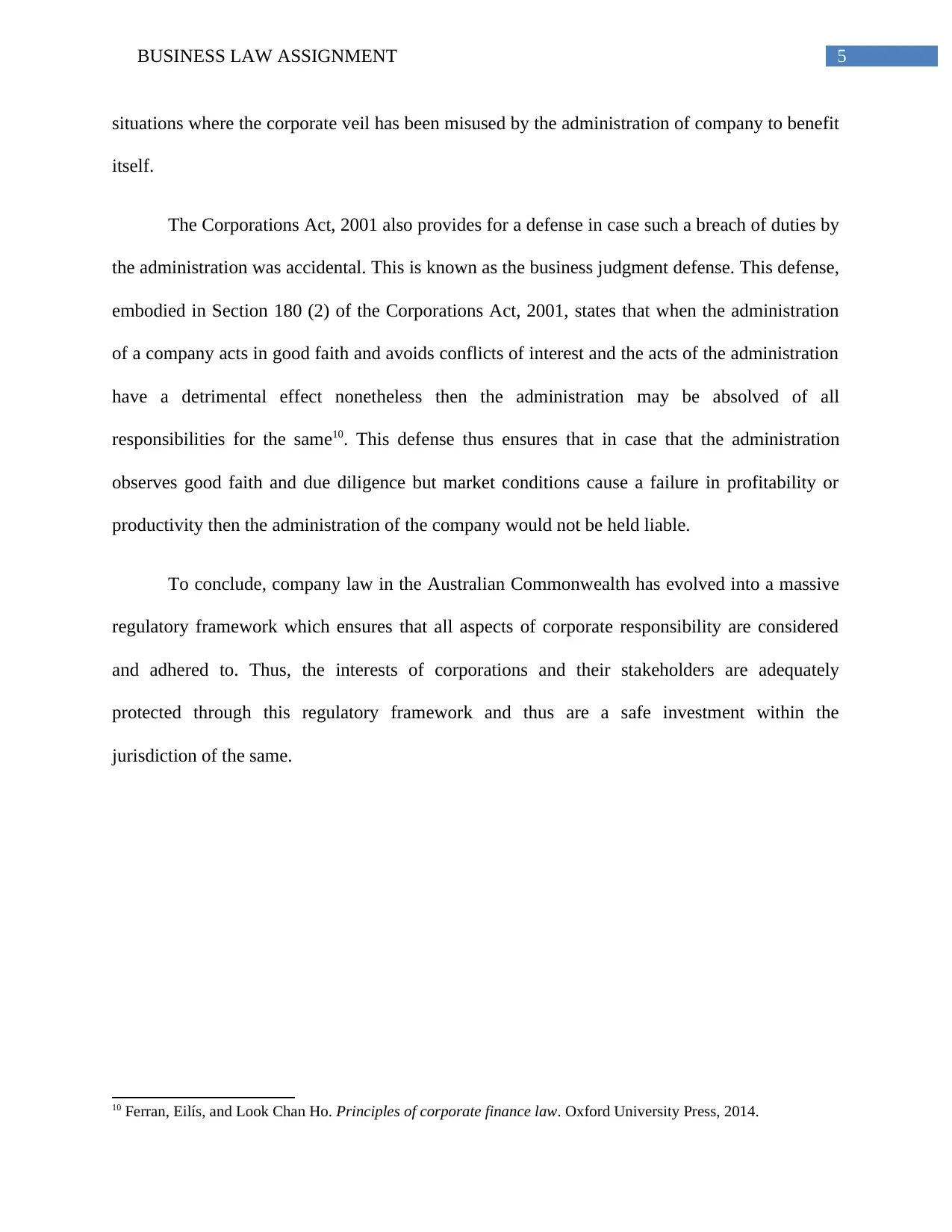
5BUSINESS LAW ASSIGNMENT
situations where the corporate veil has been misused by the administration of company to benefit
itself.
The Corporations Act, 2001 also provides for a defense in case such a breach of duties by
the administration was accidental. This is known as the business judgment defense. This defense,
embodied in Section 180 (2) of the Corporations Act, 2001, states that when the administration
of a company acts in good faith and avoids conflicts of interest and the acts of the administration
have a detrimental effect nonetheless then the administration may be absolved of all
responsibilities for the same10. This defense thus ensures that in case that the administration
observes good faith and due diligence but market conditions cause a failure in profitability or
productivity then the administration of the company would not be held liable.
To conclude, company law in the Australian Commonwealth has evolved into a massive
regulatory framework which ensures that all aspects of corporate responsibility are considered
and adhered to. Thus, the interests of corporations and their stakeholders are adequately
protected through this regulatory framework and thus are a safe investment within the
jurisdiction of the same.
10 Ferran, Eilís, and Look Chan Ho. Principles of corporate finance law. Oxford University Press, 2014.
situations where the corporate veil has been misused by the administration of company to benefit
itself.
The Corporations Act, 2001 also provides for a defense in case such a breach of duties by
the administration was accidental. This is known as the business judgment defense. This defense,
embodied in Section 180 (2) of the Corporations Act, 2001, states that when the administration
of a company acts in good faith and avoids conflicts of interest and the acts of the administration
have a detrimental effect nonetheless then the administration may be absolved of all
responsibilities for the same10. This defense thus ensures that in case that the administration
observes good faith and due diligence but market conditions cause a failure in profitability or
productivity then the administration of the company would not be held liable.
To conclude, company law in the Australian Commonwealth has evolved into a massive
regulatory framework which ensures that all aspects of corporate responsibility are considered
and adhered to. Thus, the interests of corporations and their stakeholders are adequately
protected through this regulatory framework and thus are a safe investment within the
jurisdiction of the same.
10 Ferran, Eilís, and Look Chan Ho. Principles of corporate finance law. Oxford University Press, 2014.
⊘ This is a preview!⊘
Do you want full access?
Subscribe today to unlock all pages.

Trusted by 1+ million students worldwide
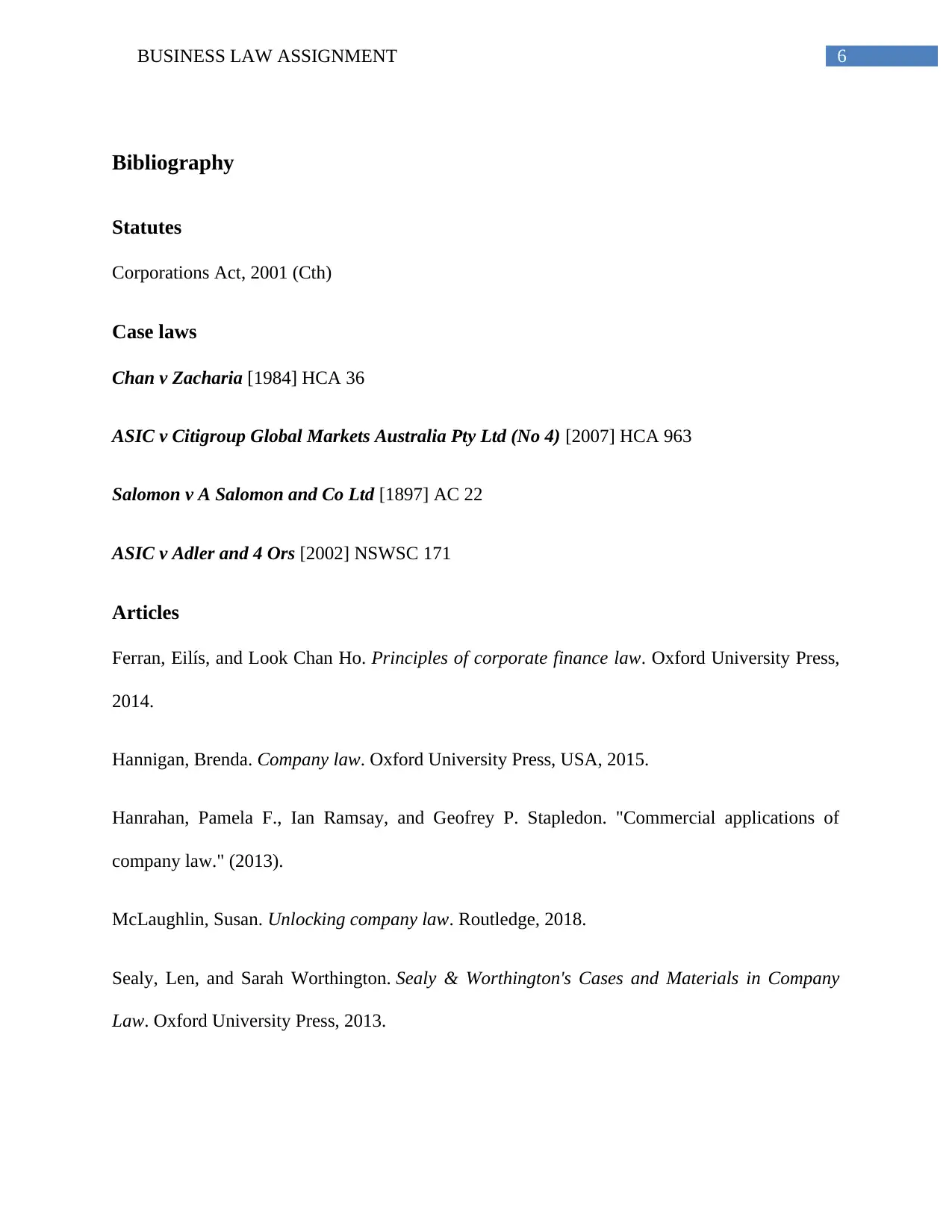
6BUSINESS LAW ASSIGNMENT
Bibliography
Statutes
Corporations Act, 2001 (Cth)
Case laws
Chan v Zacharia [1984] HCA 36
ASIC v Citigroup Global Markets Australia Pty Ltd (No 4) [2007] HCA 963
Salomon v A Salomon and Co Ltd [1897] AC 22
ASIC v Adler and 4 Ors [2002] NSWSC 171
Articles
Ferran, Eilís, and Look Chan Ho. Principles of corporate finance law. Oxford University Press,
2014.
Hannigan, Brenda. Company law. Oxford University Press, USA, 2015.
Hanrahan, Pamela F., Ian Ramsay, and Geofrey P. Stapledon. "Commercial applications of
company law." (2013).
McLaughlin, Susan. Unlocking company law. Routledge, 2018.
Sealy, Len, and Sarah Worthington. Sealy & Worthington's Cases and Materials in Company
Law. Oxford University Press, 2013.
Bibliography
Statutes
Corporations Act, 2001 (Cth)
Case laws
Chan v Zacharia [1984] HCA 36
ASIC v Citigroup Global Markets Australia Pty Ltd (No 4) [2007] HCA 963
Salomon v A Salomon and Co Ltd [1897] AC 22
ASIC v Adler and 4 Ors [2002] NSWSC 171
Articles
Ferran, Eilís, and Look Chan Ho. Principles of corporate finance law. Oxford University Press,
2014.
Hannigan, Brenda. Company law. Oxford University Press, USA, 2015.
Hanrahan, Pamela F., Ian Ramsay, and Geofrey P. Stapledon. "Commercial applications of
company law." (2013).
McLaughlin, Susan. Unlocking company law. Routledge, 2018.
Sealy, Len, and Sarah Worthington. Sealy & Worthington's Cases and Materials in Company
Law. Oxford University Press, 2013.
1 out of 7
Related Documents
Your All-in-One AI-Powered Toolkit for Academic Success.
+13062052269
info@desklib.com
Available 24*7 on WhatsApp / Email
![[object Object]](/_next/static/media/star-bottom.7253800d.svg)
Unlock your academic potential
Copyright © 2020–2025 A2Z Services. All Rights Reserved. Developed and managed by ZUCOL.



![Analysis of ASIC V. RICH [2003] Case on Corporations Act Section 180](/_next/image/?url=https%3A%2F%2Fdesklib.com%2Fmedia%2Fasic-rich-analysis-corporations-act_page_2.jpg&w=256&q=75)

